How to convert from HEX to ASCII in Python [5 Ways]
Last updated: Apr 13, 2024
Reading time·3 min

# Table of Contents
- How to convert from HEX to ASCII in Python
- Convert from HEX to ASCII using binascii.unhexlify()
- Convert from HEX to ASCII using codecs.decode()
- Convert from HEX to ASCII by parsing and joining the characters
# How to convert from HEX to ASCII in Python
To convert from HEX to ASCII in Python:
- Use the
bytearray.fromhex()method to get a newbytearrayobject that is initialized from the string of hex numbers. - Use the
decode()method to decode thebytearray. - Optionally, set the encoding parameter to
"ascii".
hex_str = '626f6262796861647a2e636f6d' result = bytearray.fromhex( hex_str ).decode() print(result) # 👉️ bobbyhadz.com
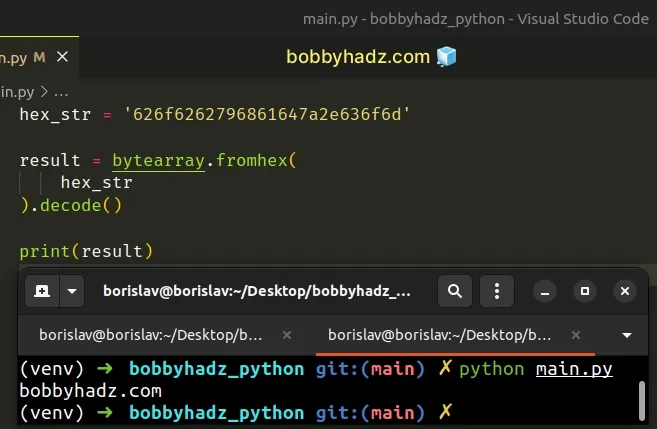
By default, the encoding argument of the decode() method is set to utf-8,
however, you can set it to ascii if necessary.
hex_str = '626f6262796861647a2e636f6d' result = bytearray.fromhex( hex_str ).decode(encoding='ascii') print(result)
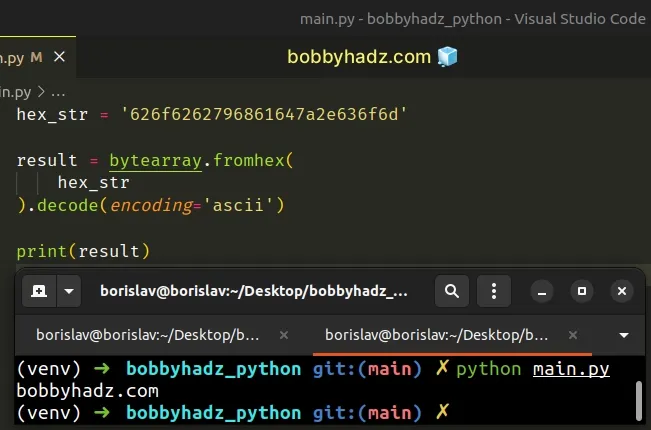
The bytearray.fromhex() method takes a string of hex numbers as a parameter
and returns a new bytearray object.
hex_str = '626f6262796861647a2e636f6d' # 👇️ bytearray(b'bobbyhadz.com') print(bytearray.fromhex(hex_str))
Once we have a bytearray, we can use the
bytes.decode() method.
hex_str = '626f6262796861647a2e636f6d' # 👇️ bobbyhadz.com print( bytearray.fromhex(hex_str).decode(encoding='ascii') )
The bytes.decode() method decodes a bytes object into a string literal.
The encoding argument specifies the encoding with which to decode the
bytearray.
There is also a bytes.fromhex method that can be used to achieve the same
result.
hex_str = '626f6262796861647a2e636f6d' result = bytes.fromhex( hex_str ).decode() print(result) # 👉️ bobbyhadz.com
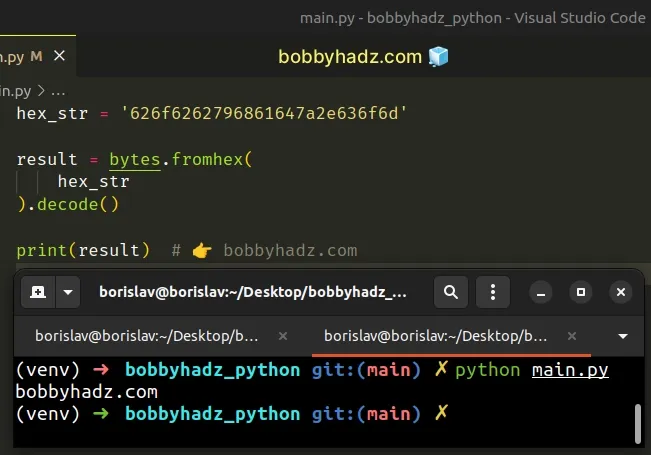
The bytes.fromhex() method returns a bytes object that is decoded from the
supplied hex string.
The hex string parameter must contain two hexadecimal digits per byte where the ASCII whitespace is ignored.
The example above is equivalent to calling fromhex() on a bytes literal.
hex_str = '626f6262796861647a2e636f6d' result = b''.fromhex( hex_str ).decode() print(result) # 👉️ bobbyhadz.com
When a string is prefixed with b, it is a bytes object.
# Convert from HEX to ASCII using binascii.unhexlify()
You can also use the binascii.unhexlify() method to convert from HEX to ASCII in Python.
import binascii hex_str = '626f6262796861647a2e636f6d' as_bytes = binascii.unhexlify(hex_str) print(as_bytes) # 👉️ b'bobbyhadz.com' as_string = as_bytes.decode(encoding='ascii') print(as_string) # 👉️ bobbyhadz.com
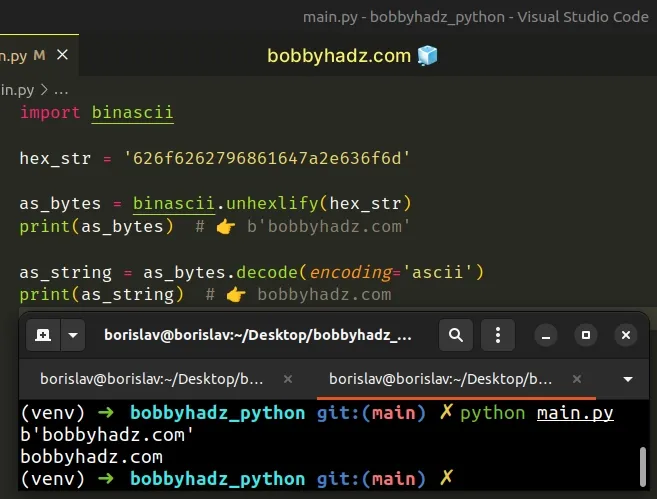
The binascii.unhexlify() method takes a hex string as a parameter and returns
the binary data represented by the hex string.
You can then use the bytes.decode() method if you need to decode the bytes
into a string.
as_string = as_bytes.decode(encoding='ascii')
By default, the encoding argument is set to utf-8.
as_string = as_bytes.decode(encoding='utf-8')
# Convert from HEX to ASCII using codecs.decode()
You can also use the codecs.decode() method to convert from HEX to ASCII in Python.
import codecs hex_str = '626f6262796861647a2e636f6d' as_bytes = codecs.decode(hex_str, encoding='hex') print(as_bytes) # 👉️ b'bobbyhadz.com' as_string = as_bytes.decode(encoding='ascii') print(as_string) # 👉️ bobbyhadz.com
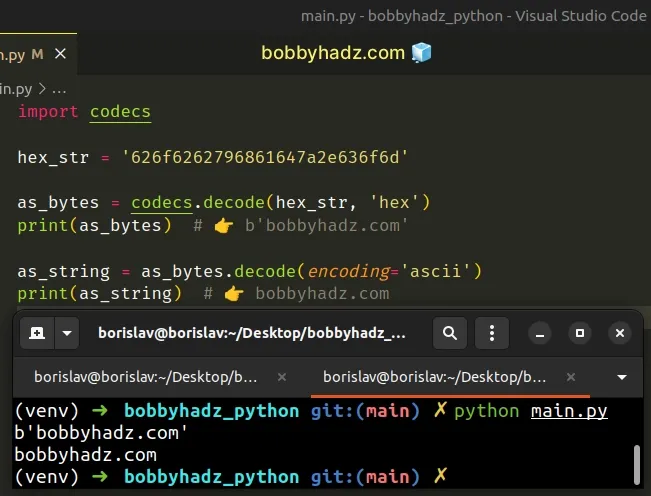
The codecs.decode() method decodes the supplied object using the specified
encoding.
The second argument we passed to the method is the encoding.
as_bytes = codecs.decode(hex_str, encoding='hex')
By default, the encoding argument is set to utf-8.
If you need to get the result as a string, use the bytes.decode() method.
as_string = as_bytes.decode(encoding='ascii')
# Convert from HEX to ASCII by parsing and joining the characters
You can also convert from HEX to ASCII in a more manual manner.
hex_str = '626f6262796861647a2e636f6d' result = ''.join( chr(int(''.join(char), 16)) for char in zip(hex_str[0::2], hex_str[1::2]) ) print(result) # 👉️ bobbyhadz.com
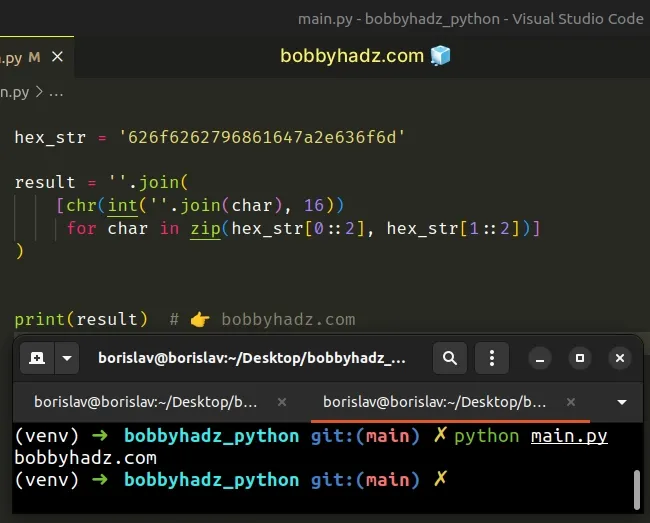
The code sample converts from HEX to ASCII by parsing and joining the characters.
Notice that we passed 16 for the base argument to the
int class because hex is a
positional numeral system that represents numbers using a base of 16.
print(int('6d', 16)) # 👉️ 109 print(chr(109)) # 👉️ m
The chr() function takes an integer that represents a Unicode code point and returns the corresponding character.
print(chr(int('6d', 16))) # 👉️
The example uses a generator expression to iterate over a
zip() object and uses the chr and int
methods to convert each byte into an integer and then character.
result = ''.join( chr(int(''.join(char), 16)) for char in zip(hex_str[0::2], hex_str[1::2]) )
The last step is to use the str.join() method to join the characters without a separator.
# Additional Resources
You can learn more about the related topics by checking out the following tutorials:

